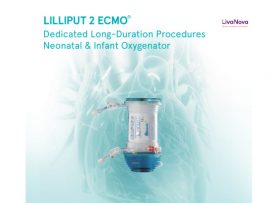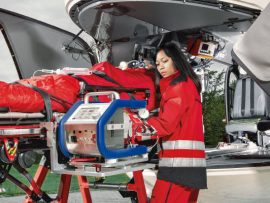Abstract Objective The aim of this study is to evaluate the effectiveness of lean six sigma management in optimizing the emergency extracorporeal cardiopulmonary resuscitation (ECPR) rescue process. Methods The existing..
Read MoreAbstract Extracorporeal cardiopulmonary resuscitation (ECPR) for refractory cardiac arrest is increasing in usage, but risk factors for seizures are largely unknown. We included adult ECPR patients in the Extracorporeal Life..
Read MoreAbstract Background: Extracorporeal cardiopulmonary resuscitation (eCPR) is a method for initiation of cardiopulmonary bypass during resuscitation of a patient with refractory cardiac arrest to support end-organ perfusion. This retrospective study evaluates..
Read MoreAbstract Objective: We aimed to characterize the impact of body mass index (BMI) on stroke in patients receiving extracorporeal cardiopulmonary resuscitation (ECPR). Methods: We queried the Extracorporeal Life Support Organization registry..
Read MoreAbstract Four randomized trials published between 2020 and 2023 compared extracorporeal cardiopulmonary resuscitation (ECPR) to conventional cardiopulmonary resuscitation and the controversial findings of the last one, the INCEPTION trial triggered great..
Read MoreAbstract Venoarterial extracorporeal membrane oxygenation (VA-ECMO) has been utilized to treat massive pulmonary embolism (PE) accompanied by cardiac arrest or refractory cardiogenic shock. Our team opted for a femoral-femoral approach..
Read MoreAbstract Aim of Study To prepare for the design of future of cardioupulmonary resuscitation (ECPR), we sought to understand physician beliefs regarding the use of ECPR and subsequent management, among physicians who..
Read MoreAbstract Research question Given the relative independence of ventilator settings from gas exchange and plasticity of blood gas values during extracorporeal cardiopulmonary resuscitation (ECPR), do mechanical ventilation parameters and blood..
Read MoreAbstract Cardiac arrest is an important public health concern, affecting an estimated 356,500 people in the out-of-hospital setting and 209,000 people in the in-hospital setting each year. The causes of..
Read MoreAbstract Objective: Children requiring multiple consecutive extracorporeal membrane oxygenation (ECMO) runs likely have ongoing cardiac pathology (eg, residual lesions, myocardial dysfunction) and are exposed to increased complications and end-organ failure...
Read MoreAbstract Objective: Children requiring multiple consecutive extracorporeal membrane oxygenation (ECMO) runs likely have ongoing cardiac pathology (eg, residual lesions, myocardial dysfunction) and are exposed to increased complications and end-organ failure...
Read MoreAbstract Background Extracorporeal cardiopulmonary resuscitation (eCPR) is a rapidly growing treatment strategy due to increasing survival rates in selected patients. Additional left ventricular mechanical unloading, using a transfemoral micro-axial blood..
Read MoreAbstract Evaluate the utility of whole-body computed tomography (WBCT) imaging in detecting clinically significant findings in patients who have undergone extracorporeal membrane oxygenation (ECMO) cannulation for cardiac arrest (extracorporeal cardiopulmonary..
Read MoreAbstract Objective: To study the correlation between the mean arterial pressure (MAP) level in the first 6 hours of extracorporeal cardiopulmonary resuscitation (ECPR) and patients’ neurological outcomes. Methods: Sex, age, basic..
Read MoreAbstract Background: Extracorporeal cardiopulmonary resuscitation (ECPR) for refractory cardiac arrest has improved mortality in post-cardiac surgery patients; however, loss of neurologic function remains one of the main and devastating complications...
Read MoreAbstract Even after the introduction of extracorporeal cardiopulmonary resuscitation (ECPR), survival after cardiac arrest remains poor. Excess release of vasoactive cytokines may be a reason for cardiovascular instability and death..
Read MoreAbstract Purpose: Targeted temperature management (TTM) is a standard of care in patients after cardiac arrest for neuroprotection. Currently, the effectiveness and efficacy of TTM after extracorporeal cardiopulmonary resuscitation (ECPR)..
Read MoreAbstract Background Survival of children experiencing cardiac arrest refractory to conventional cardiopulmonary resuscitation (CPR) is very poor. We sought to examine current era outcomes of extracorporeal CPR (ECPR) support for..
Read MoreAbstract Background Extracorporeal cardiopulmonary resuscitation (ECPR) is being used increasingly in the emergency and critical care field in Japan. A major complication of ECPR is bleeding; however, the optimal initial..
Read MorePediatric population have been affected by the Coronavirus disease 2019 (COVID-19) to a much smaller scale compared with the adult population. The severity of the disease is variable ranging from..
Read MoreAbstract Aim The prognostic effect of early therapy with cardiopulmonary resuscitation (ECPR) in patients with cardiac arrest due to (ACS) has yet to be clarified. We investigated the relationship between time interval from..
Read MoreAbstract Objective: To describe neurobehavioral outcomes and investigate factors associated with survival and survival with good neurobehavioral outcome 1 year after in-hospital cardiac arrest for children who received extracorporeal cardiopulmonary..
Read MoreAbstract Aim To assess the use of (ECPR), compared with manual or mechanical cardiopulmonary resuscitation (CPR), for (OHCA) and in-hospital cardiac arrest (IHCA) in adults and children. Methods The PRISMA guidelines were..
Read MoreAbstract Extracorporeal cardiopulmonary resuscitation (ECPR) refers to the use of temporary mechanical support as an adjunct to standard CPR in patients with cardiovascular collapse. Although it is a relatively recent..
Read MoreAbstract Background We describe implementation, evaluate performance, and report outcomes from the first program serving an entire metropolitan area designed to rapidly deliver extracorporeal membrane oxygenation (ECMO)-facilitated resuscitation to patients..
Read MoreAbstract Survival from out-of-hospital cardiac arrest (OHCA) has remained low despite advances in resuscitation science. Hospital-based extra-corporeal cardiopulmonary resuscitation (ECPR) is a novel use of an established technology that provides..
Read More















